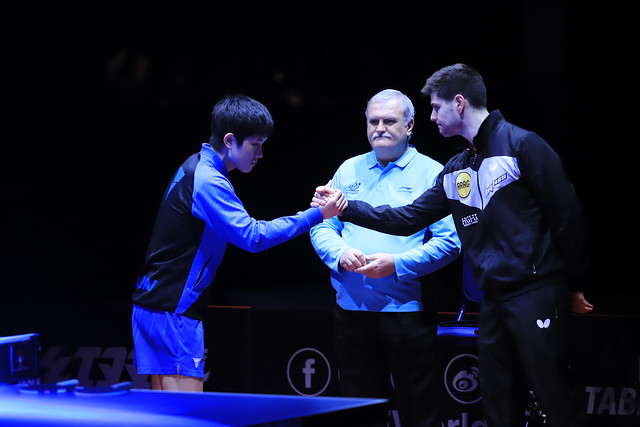by Ian Marshall, Editor
Both required to negotiate the qualification stage, in the opening round of the men’s singles event both caused upsets.
Benedikt Duda, in particular, was in scintillating form; he accounted for Japan’s Koki Niwa, the no.5 seed, in four straight games (11-9, 11-6, 18-16, 11-8). In a rather more demanding contest, Qiu Dang recovered from a two games to nil deficit to overcome Frenchman, Simon Gauzy, the no.8 seed (14-16, 6-11, 15-13, 9-11, 11-5, 11-9, 11-8).
Outstanding performances and a continuation of this year’s incredible form; notably at ITTF Challenge Series tournaments each has excelled, Benedikt Duda reached the final in Spain where lost to Kazakhstan’s Kirill Gerassimenko; one week later in Portugal, Qiu Dang emerged the winner.
Consistency
To date, commencing with the ITTF World Tour Platinum German Open in Magdeburg, in men’s singles events on the international stage, Benedikt Duda has played 15 matches, he has lost just two; in addition to the defeat at the hands of Kirill Gerassimenko, in Magdeburg he was beaten in the second round by China’s Zhao Zihao. Moreover, Zhao Zihao needed the full seven games to end the German’s progress (7-11, 9-11, 11-6, 11-5, 10-12, 11-8, 11-8).

Meanwhile, for Qiu Dang he has played 14 matches and he has experienced just one men’s singles defeat; in the first round in Magdeburg he was beaten by a player of some repute, China’s Ma Long, the reigning Olympic and European champion.
Junior careers not of note
Now, note their ages, Benedikt Duda is 25 years old, Qiu Dang is two years younger; are they not starting to blossom at just the right age?
Benedikt Duda competed in the World Junior Championships in 2012 in Hyderabad, Qiu Dang the following year in Rabat. In 2017 in Sochi, Qiu Dang was the runner up in the Europe Under 21 Championships but neither enjoyed a highly successful junior careers. They cannot compare with the likes Fan Zhendong when he was a teenager, or in present day times the performances of Tomokazu Harimoto or Lin Yun-Ju.
However, the same applied to Austria’s Werner Schlager who became World champion in 2003 in Paris, he never hit the headlines as a junior; it was the same for Sweden’s Peter Karlsson who, three years earlier was crowned European champion, in 2000 in Bremen.
Looking over shoulder
Now in the not too distant future, could such chances come the way of Benedikt Duda or Qiu Dang? Timo Boll and Dimitrij Ovtcharov are the accepted leading lights in the German team but should the next in line, Patrick Franziska be looking over his shoulder?
In Budapest, he was the biggest name to depart in the opening round of the men’s singles event; the no.4 seed, he was beaten by Takuya Jin (11-9, 12-14, 11-9, 11-8, 7-11, 11-6), at the ITTF World Tour Platinum German Open he experienced the same fate, he lost to Mizuki Oikawa, also from Japan (6-11, 11-5, 11-6, 6-11, 12-10, 11-1).
Germany ever stronger in depth but does that give Jörg Rosskopf, the national coach, a difficult decision to make for future selection? In some ways it is an enviable position but certainly he has food for thought.



